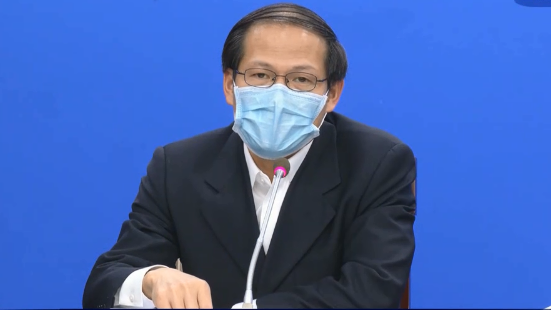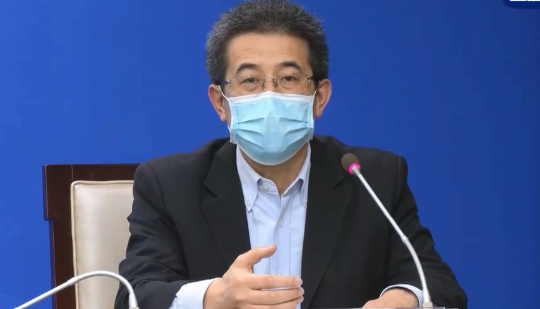Has the novel coronavirus 2019-nCov mutated? How to treat the confirmed cases with no symptoms? How long can the virus live in the air? Are there any newly discovered transmission routes?
Answers to these questions were offered by experts at a press conference on Monday, addressing the virus outbreak in Hubei Province.
Jiang Rongmeng, a member on the expert panel of the National Health Commission (NHC) and infectious diseases physician at Beijing Ditan Hospital, along with Qiu Haibo, also a member on the expert panel of the NHC and vice president of Zhongda Hospital of Southeast University, briefed the media on the latest burning questions concerning the public.

Jiang Rongmeng, a member on the expert panel of the NHC and infectious diseases physician at Beijing Ditan Hospital at the press conference, February 3, 2020. /CGTN Photo
Jiang Rongmeng, a member on the expert panel of the NHC and infectious diseases physician at Beijing Ditan Hospital at the press conference, February 3, 2020. /CGTN Photo
Q1. There have been some confirmed cases with no symptoms. Does that mean the virus has mutated?
A: (Jiang)
Up to now, there has been no clear evidence that the virus has mutated.
Q2: Will the virus mutate?
A: (Qiu)
The novel Coronavirus, a kind of virus of single-stranded RNA, is relatively stable. Its mutation rate is much lower than the influenza virus.
So far no evidence of mutation has been found. But as the course of the disease changes, experts are monitoring closely to see if the virus mutates. If it occurs, corresponding measures will be taken.
Q3. How to treat the confirmed cases with no symptoms?
A: (Jiang)
People who do not have any symptoms but are tested positive for the virus do not need special treatment. However, they still need isolated medical observations. Their infectiousness is quite low, if there is any, because the virus can only be transmitted via symptoms such as coughing and sneezing.
Q4. How long can the virus live in the air?
A: (Jiang)
The virus cannot live in the air. It only transmits through droplets or physical contact. Droplets can travel as far as one to two meters. They do not float in the air, but will descent very soon instead. That's why the virus can fall on the surfaces of many objects we touch, such as elevator buttons and doorknobs.
Recent studies have found that the virus can live several hours on smooth object surfaces. And with suitable temperature and humidity, it can live as long as five days, leading to infection when people touch them. Therefore, washing hands frequently and carefully is very important.
Q5. Are there any newly discovered transmission routes?
A: (Jiang)
As far as I'm concerned, so far all transmission routes involve contact with the pathogen. As long as you do not contact the virus, you will not get infected.
Q6. How to control fecal-oral transmission?
A: (Jiang)
Although the virus genetic material was discovered in some patients' stool, so far there have been no confirmed cases of fecal-oral transmission.

Qiu Haibo, also a member on the expert panel of the NHC and vice president of Zhongda Hospital of Southeast University at the press conference, February 3, 2020. /CGTN Photo
Qiu Haibo, also a member on the expert panel of the NHC and vice president of Zhongda Hospital of Southeast University at the press conference, February 3, 2020. /CGTN Photo
Q7: How strong is the human body's resistance against the novel coronavirus?
A: (Qiu)
The coronavirus this time is so new that human body used to have no immunity to it. So people are generally susceptible to infection with the virus. But it doesn't mean everyone will be infected and get sick.
People exposed to the virus show different responses. Some have strong immunity to clear the virus, some are infected without symptoms, some with mild symptoms, and only a small number of patients will develop into severe or critical condition. In most cases, the body's immune system will respond to it. Only when the immune system has abnormal response or the virus largely propagate will the patient develop into severe or critical condition.
Q8: What are the difficulties in treating the severe and critical cases?
A: (Qiu)
How to reduce the fatality rate and decrease the number of cases developing to severe and critical cases are crucial in treatment.
Early detection of critical cases is the first difficulty for us.
Compared to H1N1 flu and bird flu, it can take a long time for the patients of novel coronavirus to develop into severe or critical cases, without strong or typical symptoms.
That requires us to do active clinical observation and, in particular, to monitor the blood oxygen saturation.
The lack of proven effective anti-coronavirus treatment is the second difficulty, but that doesn't mean we cannot do any treatment. Research is now underway for some drugs we've found to have effects on inhibiting novel coronavirus replication, like some anti-HIV drugs.
Treatment of respiratory failure is the third difficulty, but we have developed measures such as oxygen therapy and mechanical ventilation. And the fourth difficulty is to discover treatment from the perspective of anti-inflammation and immune regulation.
Q9: Do death cases have anything in common?
A: (Qiu)
We've done multidisciplinary analysis of every death case and have found that the death cases can be mainly divided into two categories. One is relatively young patients who die of respiratory failure, but more cases are those elderly who die of complication such as coronary heart disease and cerebrovascular disease.
Q10: Since there are no specific drugs to counter the novel coronavirus-caused pneumonia, do hospitals have standard therapy for the treatment?
A: (Jiang)
Not having a specific drug doesn't mean there are no treatment measures. Acute viral infection is self-limited, which means we can eliminate the virus with our own immunity.
Usually, it takes about two weeks for the immune system to respond. That is to say some patients can recover in about two weeks after they get infected, while some, like the elderly or those with underlying diseases, can be in severe condition, and doctors give them clinical, symptomatic therapy, like energy replenishment, correction of electrolyte imbalance and organ function supports, to get them through critical condition and let their immunity work again to clear the virus.
Currently, most of the cases nationwide are ordinary or mild, and patients can be discharged from hospital in about one week. Only a few are critical cases due to their special condition.